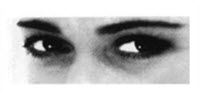Are the eyes really the windows to the soul? If not the soul, can you gaze into a person’s eyes and know what they’re thinking? Can you gauge a mood, a response to your opening gambit in a negotiation, whether or not a person is wary though their words advertise confidence — all from reading the look in their eyes?
 Are you better at reading your own gender? Are you equally good (or bad) at reading people, regardless of gender?
Are you better at reading your own gender? Are you equally good (or bad) at reading people, regardless of gender?
A few years back, The Times Well Blog featured this quiz on the mind behind the eyes. I cannot comment on the validity of this set of questions as a measurement of your skill at reading people, but it’s an interesting and entertaining exercise.
Using 36 photographic examples of eyes, the quiz tasks you with selecting among four choices of mood or emotion. Now remember… You have only the eyes as your clue, and options might range from anger to desire.
Most who take the test score between 22 and 30 out of the 36 questions, and anything above 30 means you do a good job of reading people’s expressions via the eyes. (I scored 32 out of 36. Apparently I’m good at this!)
Then I decided to take a closer look at the four answers I got wrong, not to mention those where I struggled to “read” the mind behind the eyes, though eventually I made the “correct” determination.
Of the the four expressions that I missed, three of them were men. Where I hesitated in evaluating the emotion, they were also more often men.
The Eyes as Windows Into the Soul
 What should I make of this bit of detail? Is it indicative of the fact that I do a better job of reading women than men? Is this something that would be true of other heterosexual women? Does my sexual orientation have nothing to do with it at all? Is this purely a matter of experience, exposure, or conditioning?
What should I make of this bit of detail? Is it indicative of the fact that I do a better job of reading women than men? Is this something that would be true of other heterosexual women? Does my sexual orientation have nothing to do with it at all? Is this purely a matter of experience, exposure, or conditioning?
It should be obvious that in Western societies we don’t make split second assessments of others’ intentions based on what we see in their eyes. Our context is far broader than that. We process the way a person stands or sits, their stride and hand gestures, their voice and language — not to mention the rest of the face. Would most of us score wonderfully on a “reading people quiz” if we had a 10-second video clip in place of a still of their eyes?
Now, we may enjoy waxing poetic about the eyes as windows to the soul — (thank you, William Shakespeare) — but are they, really? If we can’t read expressions well, should we shrug and simply discard the idea that it’s useful to continue to try?
It turns out there are studies of the patterns in the eyeball itself that suggest a correlation between observable structural elements as well as eye color, and both personality and character traits. (Who knew?)
If people potentially reveal so much through eye contact, then it certainly becomes necessary not to give away the store — whether rocking that pair of aces at the weekly poker game or negotiating for a higher salary.
Hide-and-Go-Seek
What about the people in our daily lives who are so expert at obscuring their feelings that we cannot read their expressions? That we cannot “know” if they’re ticked off at something we said, or absorbing it? That we’re unaware that what we interpret as defensive distance is actually a response to emotional hot buttons of their own?
 Sure, science reminds us there are signs we can discern, if we’re close enough to make them out. For example, if pupils are dilated, this can this occur when taking certain drugs, and also in darkened settings to allow more light into the eye.
Sure, science reminds us there are signs we can discern, if we’re close enough to make them out. For example, if pupils are dilated, this can this occur when taking certain drugs, and also in darkened settings to allow more light into the eye.
Another consideration?
The phenomenon of “bedroom eyes.” And we can thank a University of Chicago biopsychologist, Eckhard Hess, for pupillometrics, “the study of pupil size as an indicator of emotion,” as Body Language Expert explains:
Another thing that causes pupil dilation is physical or psychological pleasure. When someone finds another person or thing attractive, the pupils dilate. In turn, that dilation is often found attractive by others.
Read My Lips?
But what of the more inscrutable gaze? What if there’s no reading a response in the eyes, and the person we’re engaging with retreats into silence? How can we learn to moderate our responses by not presuming to know what someone else is thinking or feeling?
 I have experienced, first hand and for years, living with someone who could seemingly obscure any feeling behind his eyes. I witnessed the curtain lower, as all emotion disappeared behind a barrier, and later, I saw the curtain rise again.
I have experienced, first hand and for years, living with someone who could seemingly obscure any feeling behind his eyes. I witnessed the curtain lower, as all emotion disappeared behind a barrier, and later, I saw the curtain rise again.
This is a remarkable skill for the one who possesses it — quite the power move! — yet frustrating to the one trying to participate in an open exchange.
When I perceive myself on the receiving end of this “curtain effect” now, I respond to it like a Pavlovian dog, conditioned to process it as disapproval, distance, and more. But experience itself can be a trap. Not so long ago, I completely misread someone’s body language, specifically, a sort of gestural shifting combined with a change in the expression of the eyes.
And I jumped to a very wrong conclusion.
Body Language Is Only Part of the Picture
The point of that mention?
 I believe we can gain a great deal of insight through observation, and by recognizing patterns in the expressions of those around us. I also believe in paying attention to our intuition (the “gut” if you prefer), and to eye contact or its absence. But we must also be aware of situational context, how well we know the person we’re with, and tone of voice. We would be wise to carefully parse the language we think we’re hearing, to remember that words are subject to interpretation, and even adding an ample dose of people-reading skill, we shouldn’t assume we know what is actually going on behind the eyes.
I believe we can gain a great deal of insight through observation, and by recognizing patterns in the expressions of those around us. I also believe in paying attention to our intuition (the “gut” if you prefer), and to eye contact or its absence. But we must also be aware of situational context, how well we know the person we’re with, and tone of voice. We would be wise to carefully parse the language we think we’re hearing, to remember that words are subject to interpretation, and even adding an ample dose of people-reading skill, we shouldn’t assume we know what is actually going on behind the eyes.
Take cues and clues where we can?
Of course. But steer clear of assumptions and quick conclusions — especially if the stakes are high.
You May Also Enjoy
Leave a Reply